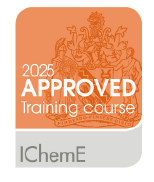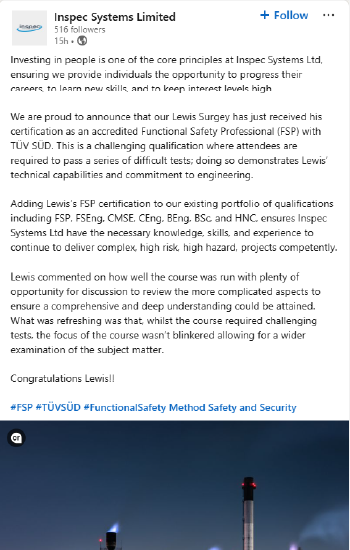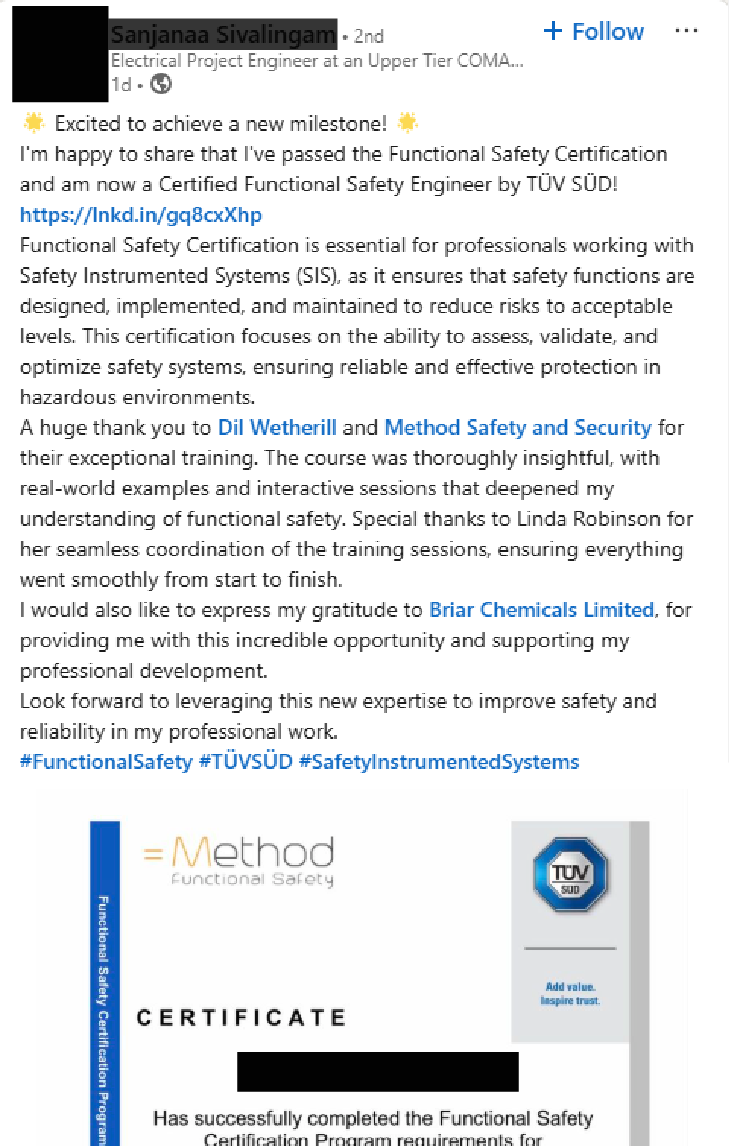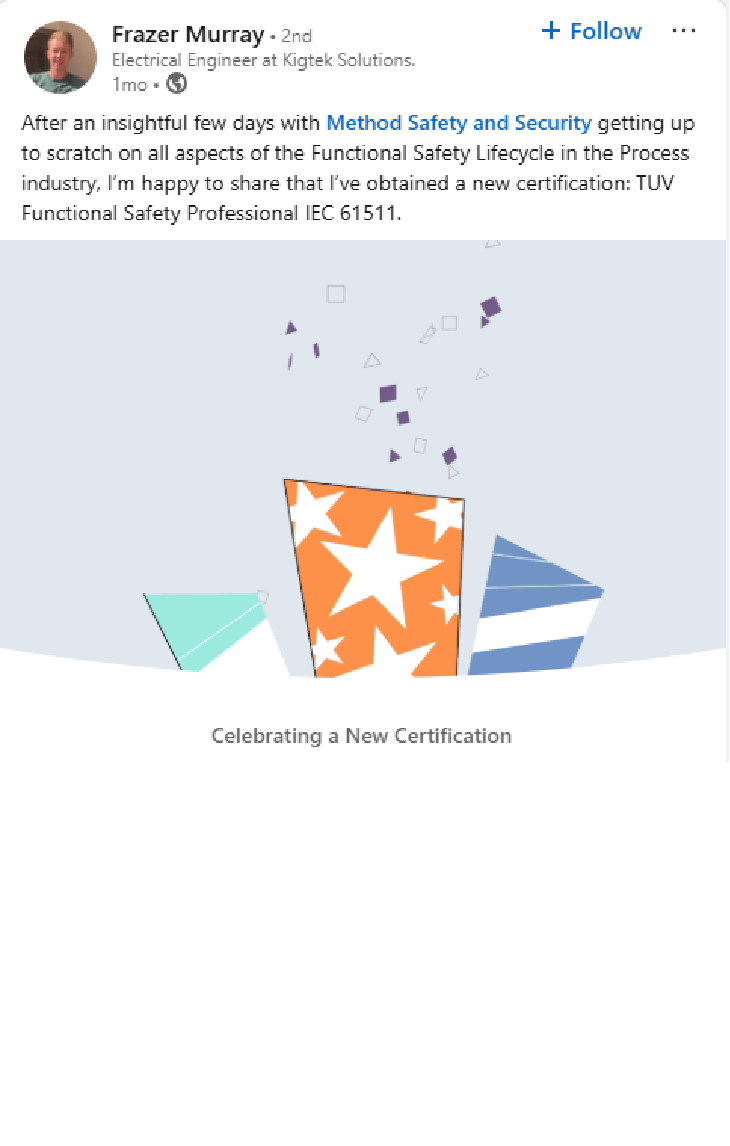
 As part of the TUV SUD Functional Safety Certification Programme, =Method offers the TUV SUD certified training course.
As part of the TUV SUD Functional Safety Certification Programme, =Method offers the TUV SUD certified training course.
The course is universally recognised as the essential qualification for professionals and engineers working with any aspect of the Functional Safety lifecycle in the Process and Power industries. The course provides an overview of the entire IEC 61511 lifecycle and details how key aspects such as Verification, Validation, Functional Safety Assessments and Audits can be practically implemented.
On successful completion of the course and the examination, delegates that can demonstrate the required level of experience will achieve either the “TUV Functional Safety Professional” or “Functional Safety Engineer” awards. Certification takes place in cooperation with TUV SUD.

Classroom
![]()
The Course is delivered over 3 days, followed by a 4-hour exam on the 4th and final day.
Live Online
![]()
The Course is delivered as 6 x 4 hours sessions (usually mornings) over a 1 week period, followed by a 4-hour examination at a nominated venue and date in the weeks following the training.
On Demand
![]()
Web-based On Demand Modules which allow you to work through the syllabus at your own pace. Modules are supported by Live Online tutorials delivered over 2 weeks to provide extra detail and to answer questions.
Course Content
-
Functional safety management
-
Life cycle concept, documentation requirements, verification, validation, assessments and audits, modifications
-
-
Hazard & Risk Analysis
-
Hazard identification, hazard analysis, risk reduction, safety function definition using FTA, HAZOP, LOPA, Risk Matrix, Risk Graph
-
- Planning the safety system
-
Safety planning for designers, end users and integrators, verification plan, validation plan, Safety Requirements specification, requirements for suppliers
-
-
Hardware design
-
Hardware lifecycle, low demand, high demand and continuous mode, redundancy, diversity, hardware fault tolerance, safe failure fraction, type A/B, architectural constraints, proof testing, diagnostic tests, measures to avoid and control failures
-
-
Hardware reliability
-
Reliability modelling, FMEDA, failure data, PFD, PFH, SIL
-
-
Software design
-
Software lifecycle, embedded software, application software, fixed programming languages, limited variability languages, full variability languages, software architecture, V-model, measures to avoid failures
-
- Operation and maintenance
-
Installation and commissioning, safety validation, operation, maintenance and repair, modification and retrofit, maintenance override
-
Who should attend
Engineers and professionals who require a broad level of knowledge and may be responsible for functional safety, its principles and methods, within their workplace.
The criteria for TUV Certification is as follows:-
There are no formal pre-requisites to attend the training course but experience of Functional Safety in general and the IEC 61511 standard is advantageous.
A delegate can be awarded with a Functional Safety Engineer (FSEng) certificate if they
- Achieve at least 60% in the examination, having attended the full training course with no experience or academic qualifications.
A delegate can be awarded with a Functional Safety Professional (FSP) certificate if they
- Achieve at least 75% in the examination, having attended the full training course.
- Satisfy the experience / qualification criteria as recorded on the registration form (delegates who do not satisfy the experience / qualification requirements will be awarded the FSEng qualification).
- Can demonstrate 6 years’ experience in an applicable industry for which formal education gives credits as follows:
deduct 2-years for first degree e.g Bachelor,
deduct 3-years for Masters,
deduct 4-years for PhD. - Provide 2 references as confirmation of relevant industry experience.
Exam format
Closed book exam.
Open questions: 50 marks.
Case study questions: 50 marks.
Examination process for Live Online courses
TUV Certification requires taking a “closed book” examination. The delegate will therefore be required to attend the invigilated examination at a nominated venue in the weeks following the training. Please refer to the specific course schedule for further details.
After this training course you will be able to
- Communicate the essential elements of functional safety to your colleagues, management and peers in industry.
- Apply functional safety management.
- Understand and play a role in hazard and risk analysis.
- Determine the required SIL with risk graph and matrix methodologies.
- Understand how to verify and validate safety instrumented systems.
- Understand the basic requirements of the functional safety standards.
- Create basic designs of safety instrumented systems, taking into account architectural constraints.
- Understand the effect of redundancy, diagnostics, proof test intervals, hardware fault tolerance on the SIL.
- Understand the routes by which devices can be shown to be compliant.
What you will get
- The course material.
- A Certificate of Attendance for each delegate that attends the full course, and
- A TUV Certificate on successful completion of the programme and a listing on the TUV SUD website. TUV SUD Certification is valid for life.
Course Enquiries
If you have any further questions, please contact us and if you wish to proceed, check your diary and reserve a place.
Linkedin Feedback
Latest testimonials taken from linkedin. Click for information on Linkedin.

IChemE Approved Training Course
=Method TUV Certified 61511 Functional Safety Training Course has been approved by the Institution of Chemical Engineers (IChemE). IChemE Certificate

The TUV SUD Certificate is valid for life
Recent delegate comments:
"You need to be exposed to the concepts for a number of years beforehand."
"I will encourage more people at work to come."
"Professional, well organised course providing essential structure to develop Functional Safety knowledge. "
"Course is insight to best practice."
"Good mix of real life examples and experiences complimenting the legal compliance."
"One of the best trainers I have ever had"
"I would recommend the course."
"Excellent knowledge and very engaging training style. The food was excellent."
"Course was presented in an informal, informative manner. This made a difficult subject more easier to comprehend."
"Good delivery of the theory with throw-ins of sketches and real life examples and recaps of important parts."
TUV Functional Safety Exam Question Guide Functional safety acronyms, abbreviations and titlesE: support@methodfs.com. T: 44 (0)1462 713313. W: www.methodfs.com
 Keep up-to-date
Keep up-to-dateReceive our views on the latest industry developments and/or our latest training course dates.
SUBSCRIBE HERE






